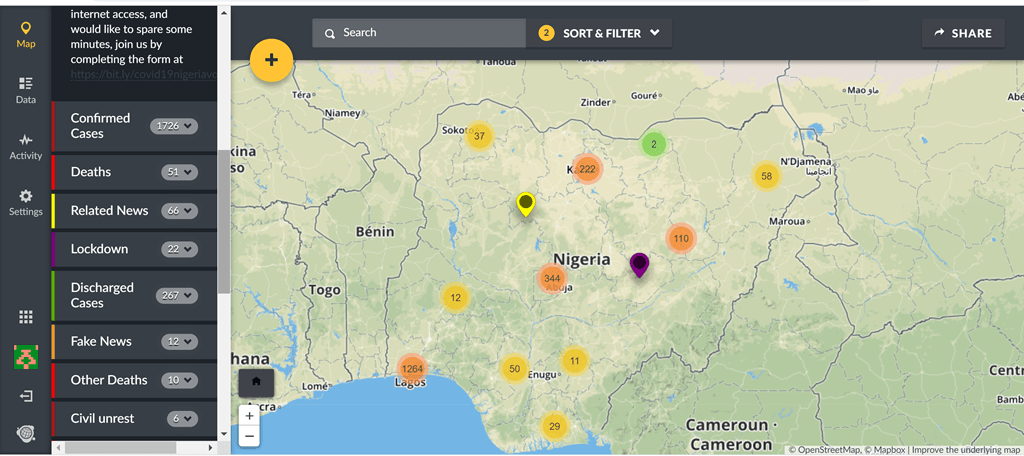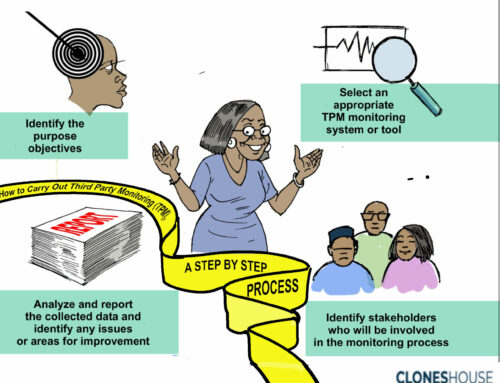[Data used in this article can be found at https://docs.google.com/spreadsheets/d/1TIKi5ZcNQcTCrc4TnmRXce5tnNG_Hx4S7z7vAjDwbFs/edit?usp=sharing and on our monitoring platform at https://covid19nigeria.ushahidi.io/ ]
Testing Capacity
As at the end of May 1, 2020, Nigeria has recorded 2,170 cases in 34 states and the Federal Capital Territory. (In our last published analysis on COVID19 in Nigeria, we predicted Nigeria might have 1,885 cases). 351 has been discharged, and 68 deaths has been recorded. This means 3 out of every 100 that tested positive to the virus infection has died since the first case was reported on February 28. Looking back in time, it might seem incomparable to the fatality rate in New York which reported it’s first Coronavirus case few days after Nigeria announced its first case. In this piece, we will analyse the testing capacity, and lock-down measures, while providing information on current trends of misleading information in Nigeria.
The last few days in Nigeria has seen a spike in the number of cases, but the government intends to ease the lockdown, from May 4, in major cities like Lagos, and the Federal Capital Territory. The last week of April recorded confirmed cases that were more than the number of cases recorded within the previous 2 months. The total number of confirmed cases between Friday, April 24, and Friday, May 1st were 1,189 while confirmed cases between Thursday, February 27, and Thursday, April 23 were 982. Perhaps an increase in testing in that week must have accounted for those numbers.
During this reporting period, Nigeria’s testing capacity was still the lowest when compared to other countries that had their first case of the Coronavirus reported on February 27. Within the first 50 days of the pandemic in Nigeria, the Nigeria Center for Disease Control (NCDC) was carrying out an average of 133 tests in a day. However the capacity to carry out more tests was increased to an average of 650 tests per day between Friday, April 17 – Friday, May 1. Actually, on the 31st of March, NCDC reported that it carried out 2,070 tests.
Well, within the coming weeks, 2,000+ tests should become the average daily tests, at least for the moment. It will also be helpful if the state government can start mobilizing for more testing in their states. If they are looking for private organizations to provide support in that direction, LifeBank and 54gene might be a lifesaver. Lifebank, a medical delivery company in Nigeria is now helping to conduct mobile tests in Lagos and Oyo states. 54gene, an African genomic research company, is also helping to facilitate testing in Lagos and Ogun states. This might also be an opportunity for civil society organizations to pivot their mission, to support in testing, and maybe tracing of contacts. Would all this be enough? Only time can tell!
Lock down and its effect?
But are the lock – downs reducing the numbers? In Nigeria at the moment, this might be difficult to ascertain.What we currently know is that a larger percentage of cases and deaths were recorded during the “supposed lockdown” that was extended, and planned to be strengthened on the eve of Easter Monday. For example, Lagos, and the Federal Capital Territory, had 830 and 157 confirmed cases respectively, that’s over 70% of their total cases. It will be worth waiting to have a comparison data if the ease of lock down commences on May 4, as announced by the federal government. If we would want to borrow a leaf from Ghana, Taiwan, Spain, Italy, Australia,and New Zealand, we might want to quickly state that making people stay at home has flattened the curve. South Korea, and Sweden have not locked down their country yet, but Sweden is becoming the epicenter of the virus in the Scandinavian countries with 2,679 deaths when compared to Denmark, Finland and Norway with 484, 230 and 211 total deaths respectively.
Almost all states in Nigeria has announced it is “locking down” in one form or the other except for Kebbi state whose governor has said the state will not be shut down for the virus. Five out of the 35 states that had at least one case of the virus are on partial lock down. This includes Bauchi, Katsina, Jigawa and Nasarawa states. Even as most states announces lock-down, evidence has shown that some government officials and their citizens are not adhering to the lock-down rules. For example, in the business capital of Nigeria – Lagos, citizens are still able to commute within and outside of Lagos, albeit, with the help of security officials. In the Federal Capital Territory, through its satellite towns like Gwagwalada, residence can still conduct their businesses, and also exit the territory to neighboring states.
Nigeria was never on total lock down, during this period 15 more states recorded cases of Coronavirus, and some of their index cases were citizens defying the lock down in high risk states , and traveling to these states. For example, the index cases of Ebonyi , Bayelsa and Gombe states traveled to these states from high risk state like Lagos, FCT, and Kano. Moreover, while the federal government was announcing its guidelines to extend shutdown of Lagos, FCT an Ogun states, the Northern state governors had agreed not to shut down their states. This position changed some days after, when states like Kano, Gombe, and Borno started witnessing a rapid increase in the number of cases. So , little wonders, if there was an effective stay – at – home since the beginning of April, when the federal government announced a shut down in the major cities where the cases of the virus had been reported. In the meantime, we will suggest that a total lock down be considered for 20 days in 33 states and the Federal Capital Territory, and it should be enforced by a civil – military intervention. Benue and Enugu States are an exception. They are the only states that have had less than 5 cases within a 31 day period. Kogi and Cross River states has not reported any case yet, so they can be exempted as well.
Fake News and its Economy
During this period, scam related news has become prominent according to our preliminary analysis. Currently, we are analyzing reports from 30 WhatsApp groups that comprise 10 religious, 10 community association, and 10 civil society WhatsApp groups. Each one of the groups has more than 200 members. To complement this, we are assessing 10 Facebook groups and 5 websites that are debunking fake news in Nigeria. Since we launched our monitoring platform in the early days of March, we have highlighted 62 fake news reports, with a larger percentage of that coming from community association WhatsApp groups. Some people have fallen victim to some of these WhatsApp posts that are linked to a fictitious website, which later will request for bank details of the victim. Some of the banks and telecommunication companies used by the originator of these fake news have started informing their customers about such misleading activity.
A screenshot of one of the website that information on Whatsapp direct victims of mischievous information
At this period, most Nigerians have lost their means of income, or income has dwindled, as such logic is entirely thrown to the wind, and replaced by emotions. Most lower-income or those with no income at all rely on those living on an average income. But in this case, where jobs are becoming nonexistent, even before the virus, their dependents will have to resolve to a reduction in support, or they get nothing at all. Also the oxygen of uncertainty is filling the atmosphere every second, as people whose major income relies on daily transactions have been restricted from going to trade. Those that earn monthly salaries have been told not to come to work but, to “work from home” (WFH). Truthfully, Nigerians do not work from home. The government offices have never worked from home. Learning institutions have never taught classes via online portals. Maybe this will change the tide in the near future, but not to think the change to WFH has happened quickly. No, it will not, rather it is jobs that will be cut, especially for positions that are not relevant to organizations profitability or impact, and those that technology can replace. For example – will a country continue to use taxpayers money to support a full-fledged legislative and executive arm of government, considering a negative cost over benefit? No, so the government will have to cut its cost to governance. Can clerical work be done via emails? if it can, then companies or the government will lay off those involved with clerical works. Another example is if bank transactions can be done online to a larger extent, then there will be little need for more branches. If job cuts don’t happen because of the virus, forward thinking governments and businesses will resort to cutting expenses, if return over investment is still considerable.
If people have, or are losing their income, or will lose their income during this pestilence, it then suffices that the government should provide palliatives for its tax paying citizens. Some governments are responding to the pandemic by providing for their citizens creatively, and with structures that have been put in place pre-COVID. Nigeria’s case is different, as it does not have a comprehensive, “reliable” database of its citizens which can make it provide incentives without compromising the social distancing rule. But what can be done at the moment? Through the Central Bank of Nigeria, and other commercial and microfinance banks, we think bank transfers of NGN 10,000 should be initiated to 10 million women that are within the age of 30 – 45, and who have less than 0+ Naira in their “active” bank account. So we said zero plus because this random sampling could be incremental until 10 million women are reached. Why women? Women in Nigeria, at that age, are mostly responsible for their families, and can also provide for their extended family members. Why 10,000 Naira, it’s a fund to support the family for two weeks of the lockdown. An initial 10,000 Naira to 10 million Nigerian women is 10 billion Naira( 258 million USD). What – that’s about the total amount the European Union has contributed to Nigeria’s humanitarian support since 2014, but here is the good news – it’s not up to 10% of the amount that was just approved by the International Monetary Fund to support COVID-19 response in Nigeria. This neglects other contributions that have been made towards COVID19, and possibly, support by the state government to their citizens.
Conclusion
Confirmed cases are increasing by the day, likewise fake news distributed via community association whatsapp groups. Testing capacity has increased, but not sufficient to think that lock down should be eased. There are no quick fixes to stemming the impact of Coronavirus in Nigeria, as these are reflections of the failures that have been experienced since 1960. Nevertheless, creative ways of alleviating the suffering it will bring should not be far-fetched – like providing cash incentives to middle – age group women; announcing a 20-day lock-down that is enforced by civil-military joint operations in 33 states; and encouraging public, private partnerships in conducting tests. It is clear – In the coming weeks, if you can, do stay off the streets, and stay safe!




